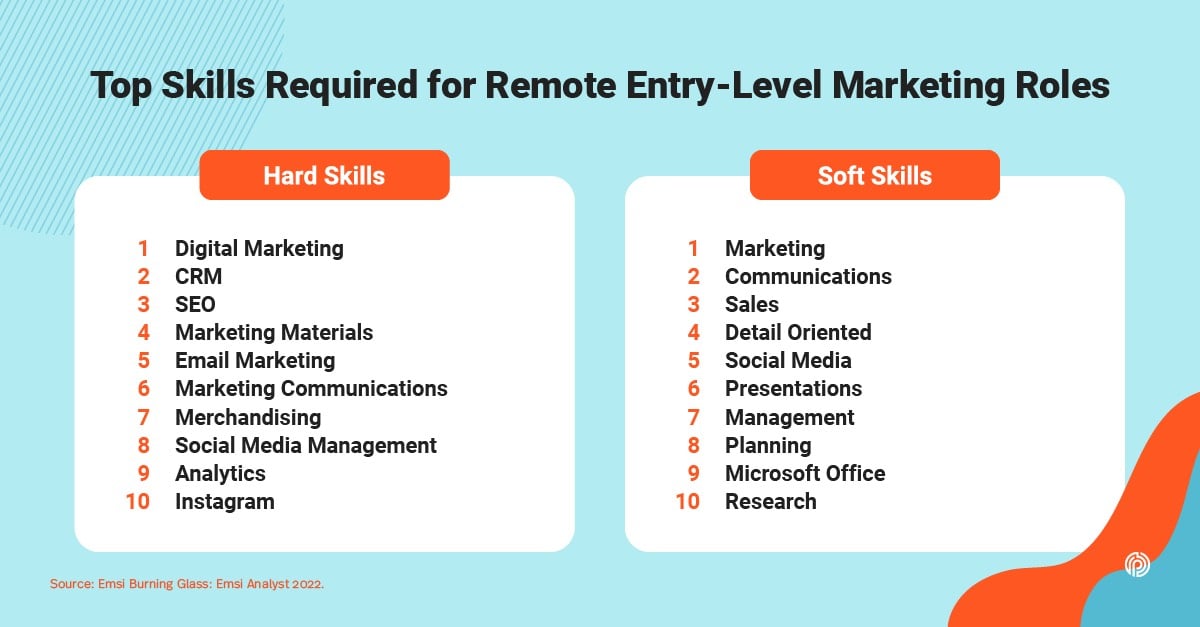Written By:
Michael Boyles
Imagine you’re trying to land a job at your dream company. You’ve done everything right and completed multiple interviews. You’re incredibly confident, expecting an offer soon, when an email shows up in your inbox. Your heart drops as you read the words “Thank you for your interest in our company. Unfortunately, we’ve decided to continue with another candidate at this time. Best of luck!”
For many of you, that scenario isn’t hypothetical—it’s a regular occurrence.
If you're looking for your first marketing job, you're almost certainly familiar with the challenges of applying to entry-level positions. One of the most common is the expectation for candidates to have 2-3 years of experience under their belt. As an entry-level worker, however, it can be hard to obtain this preliminary experience just to land a position at your dream company on the ground-level.
While some companies simply won't consider your application unless you have experience, some are looking for an eagerness to learn and a passion for marketing above all else. Here are some tips for finding entry-level remote marketing jobs—even if you have no relevant experience to speak of.
Finding a Remote Position
With the rise in remote working across multiple industries in response to the COVID-19 pandemic, workers are actively seeking out positions that are fully remote. Some workers want to avoid morning commutes or horrible breakroom coffee, and others work remotely out of necessity.
Because of this, looking for remote jobs adds an additional challenge to your search. When you apply to in-person positions, you're competing against local applicants or individuals willing to relocate to that area. This typically makes the list of candidates smaller, strengthening your chances for an interview and, ultimately, getting the job. Applying for a remote position, however, expands the pool of applicants you're competing with. Instead of a small radius of locals, you're competing against anyone with a wireless connection and computer.
There’s good news though! As the competition expands, so do the number of opportunities. You no longer have to confine your search to your immediate geographic area. Even many companies that operate in-person offer qualified candidates the option to work remotely.
Learn how to stand out from the crowd by following these 14 tips to landing your first remote marketing position.
14 Tips For Landing Your First Remote Job
1. Gain Personal Experience
While the requirements for entry-level postings can be highly discouraging, the good news is there are many ways you can obtain experience on your own. Here are some tips:
- Create a personal website/portfolio: Free website building platforms like Wix or Wordpress can highlight your skills, showcase your portfolio, and demonstrate that you're a self-starter.
- Look for volunteer opportunities: Volunteering your services to local non-profits, family businesses, churches, or schools in your area is a great way to get marketing experience without going through an application process.
- Stay up-to-date on marketing news: One of the most commonly asked questions during interviews for marketing jobs is "what blogs/influencers do you follow?" Whether you are an entry-level remote worker or a marketing strategist, it's important to stay up-to-date on the marketing world—as it changes regularly.
Being a self-starter is important when applying to any job, but especially for remote positions. It demonstrates that you can work well on your own without oversight or guidance. Since working remotely means functioning without any direct supervision, it's important to demonstrate your motivations to prospective employers and eliminate any doubts they might have about your potential productivity.
2. Clean Up Your Resume
Having a clean resume is critical when applying for jobs. It's likely the first thing prospective employers see when reviewing your application. So if your resume looks unprofessional, your application will likely be discarded, regardless of whether you're a good fit for the role.
Here are some tips for writing an effective resume that won’t get tossed from the pile:
- Keep it concise: Hiring managers often receive an abundance of applications for one position, so if you give them a novel it probably won't be read. Limit your resume to only one page.
- Clearly communicate your skills: Don't just list your skills on your resume. It’s more effective to explain how you acquired your skill set. For example, if you're skilled at writing blog posts, don't just list "writing" on your resume. Instead, concisely explain where you developed that skill, or how it can benefit the company.
- Don’t exaggerate your skills: While it's important to communicate your qualifications in a professional way, don't exaggerate your skills to imply experience you don't have. Employers often use your resume, and the experience listed, to frame questions in your interview. So be clear about your skill set and avoid awkward situations during the interview, or even onboarding, process.
- Make sure it’s ATS-friendly: An applicant tracking system (ATS) is a piece of software that employers use to automatically filter resumes. Approximately 75% of employers use ATS or recruiting software, so it's important to ensure that your resume can be read by this program. Take the time to look up what this software scans for, and format your resume accordingly.
- Don't use an image-based template: There are tons of snazzy resume templates out there, but the reality is many of these won’t even make it to the employer because they'll get filtered out by the ATS software. Resumes with images, for example, are difficult for an ATS to process and will likely be rejected automatically.
- Incorporate the job description: The job description is an excellent source of information. If you have any of the relevant skills or experience listed on the posting, customize your resume based on the job description. But remember, never put a skill on your resume that you don't actually have.
- Use a professional email address: Approximately 76% of resume rejections are due to an unprofessional email address. While it's perfectly fine to use a free platform like Gmail, you want to avoid using your personal email if the address is unsuitable for business. Consider creating a new one for the purpose of job searching.
- Don't include references unless requested: Including references on your resume doesn't serve much of a purpose except to take up valuable space. If your employer wants you to provide references, they'll ask for them. Otherwise there's no need to provide them. Don't even include a sentence explaining that references are available upon request. Again, this only takes up valuable real estate on your resume.
3. Write a Compelling Cover Letter
Cover letters can be the most time-consuming part of applying for jobs, but it's important to take the time to write a good one. Your cover letter is a chance to introduce yourself and demonstrate your creativity and passion. Don’t just rehash your resume. Take the opportunity to explain how you've obtained your skills and why you would be a good fit for the company.
It’s a good idea to create a cover letter template for yourself to save time, but try not to rely on it too heavily. Customize the template based on each company you’re applying to. Employers want to see you take the time to research and customize your application according to their culture, mission, and history.
4. Work on Developing Your Skills
One of the best ways to simultaneously grow your skill set and foster authenticity is to earn marketing certifications. This allows you to showcase your expertise and demonstrate your passion for marketing. Several companies offer free marketing certifications, including:
If you manage to earn a certification, put it on your LinkedIn profile and highlight it on your resume.
Wondering what skills you should work on developing? Here's a list of some of the top skills required for remote entry-level marketing jobs, as well as relevant certification courses you can take to demonstrate these skills.

Top Hard Skills
Here are the top ten hard skills employers include in job postings for remote entry-level marketing jobs:
- Digital Marketing
- Customer Relationship Management
- Search Engine Optimization
- Marketing Materials
- Email Marketing
- Marketing Communications
- Merchandising
- Social Media Management
- Analytics
Top Soft Skills
Employers don’t just look for hard skills when evaluating applicants. While technical skills are important to acquire, soft skills are equally important in marketing. This is especially true in client-facing positions.
Here's a list of the top ten soft skills employers list in remote entry-level marketing positions:
- Marketing
- Communications
- Sales
- Detail-oriented
- Social Media
- Presentations
- Management
- Planning
- Microsoft Office
- Research
Try to develop these skills in a demonstrable way so you can build your confidence and marketability. You might find that different industries have varying skill requirements. For example, as an inbound marketing agency, here are some of the top skills we look for at Pepperland:
Hard Skills
- Inbound Marketing
- HubSpot
- Content Marketing
- Email Marketing
- SEO
- Social Media
Soft Skills
- Communication
- Creativity
- Eagerness to learn
- Self-starter
- Passion for marketing
Obtaining HubSpot certifications is a great way to learn and demonstrate each of these skills—hard and soft. (In case you missed it—we're huge fans of HubSpot!)
5. Be Willing To Do What Other Candidates Aren’t
Setting yourself apart from other candidates is an excellent way to get noticed by prospective employers. Don’t just apply to as many jobs as you can with little regard for the position or the company itself. Instead, make an effort to connect with prospective employers. Every application—even a rejected one—is an opportunity to grow your professional network.
Here are some ways you can stand apart from the crowd:
- Connect with employees on LinkedIn: Connecting with employees on LinkedIn is a great way to get your foot in the door and build your network along the way. Don’t pitch yourself though—that’s what your application is for. Instead, try to form genuine connections with prospective employers. For example, try to start a conversation around a blog post they’ve recently written or published. Ask questions about the content and establish a relationship outside of “what they can do for you.”
- Write a blog post based on the job posting: Take a look at some of the skills or terms you see on the job posting and write a blog post focused on these topics. For example, if you notice keyword research is an important skill in the job posting, write an article on how to conduct keyword research. Then send it to a member of the team and ask for feedback. Even if you've never done keyword research, this will show your prospective employer that you have a passion for learning—an essential soft skill for any entry-level position.
- Send great follow-up emails: When you've completed an interview, send an email sincerely thanking your interviewer for their time. Try and personalize it by mentioning something specific that you discussed during the interview. This personal touch can help separate you from other candidates who also send follow-up emails.
6. Don’t Put Your Eggs in One Basket
While it’s important to stand out, it’s equally important to strike a balance between standing apart and investing too much in one particular company. Without this balance, you can set yourself up for the feeling of disappointment and defeat every time your application is turned down. Job searching is a process that can take months (even years). It's important to stay on top of the job hunting process to avoid completely starting over every time your application is rejected.
Furthermore, don't be afraid to use features like the "easy apply" button on LinkedIn. While you want to do your best to stand out, it certainly doesn't hurt to get your resume in front of as many prospective employers as you can.
7. Thoroughly Read Each Job Posting
As tempting as it may be to attach the same resume and cover letter to every application without reading through the description, it's important to avoid blindly applying to jobs. In addition to the useful information job postings contain that can be incorporated into resumes and cover letters, many employers include additional required steps toward the bottom of the page (e.g., requiring the cover letter and resume be sent to a specific email address).
8. Consider Looking For Internships
While an internship may seem like settling, it’s an excellent way to get your foot in the door with a company. It can even lead to a full-time position with the company later on. In fact, approximately 68% of interns are offered positions at the companies they intern with. While this process might take longer in the short run, it’s a great way to gain experience, with or without a full-time offer. And, if the internship is paid, it’s a great way to earn some money along the way.
9. Nail Your Interviews
Interviews are your opportunity to shine and clearly communicate why you'd be a good fit in the role and at the company. Here are some interview tips:
- Do your research: Make sure you thoroughly research the company before showing up for the interview. This will help you come up with questions, demonstrate your interest, and help you determine whether the company is a good fit for you.
- Ask questions: While researching, try to come up with 4 or 5 questions to ask in the interview. This shows that you've done your research and tells employers that you're eager to be part of their team.
- Dress well: Even if the job has a relaxed dress code, dress to impress for the interview. Dressing casually can communicate that you don't care about the position, even if the company culture is a little more relaxed.
- Be transparent about your experience (or lack thereof): Don’t fake it ‘till you make it. If you don’t know what you’re talking about, prospective employers will know. Be transparent about your lack of experience, but frame it positively by expressing a desire to learn.
- Make sure you have a stable WiFi connection: If you're looking for a remote job, having a decent WiFi connection is critical. While technical difficulties are sometimes unavoidable, you should do your best to prevent them.
- Use the right background: If your interview is a video call, make sure the background in your video isn't messy. A sloppy background won’t likely impress prospective employers, and sometimes these small details are even enough for employers to choose one candidate over another.
10. Learn From Your Mistakes
Every rejected application is an opportunity to learn what you can do better. If an employer tells you they’ve decided to move forward with another candidate, reach out sincerely thanking them for their time and expressing that you'd love to hear any advice they can provide for future interviews.
11. Look at Multiple Job Boards
While you may have a favorite job board, it’s important to apply for jobs on multiple platforms as they may have different opportunities.
Here are some excellent options:
It's important to note that there are several job boards that promote unique postings—but, for a fee. It's probably best to avoid signing up for those services, especially when looking for your first job. Although it’s tempting to think your resume will have greater visibility if you’re paying for it, the reality is companies that post on paid job boards likely have those same opportunities listed on free versions as well. Subscription-based job boards might make your search more convenient, but it's probably not worth the cost.
12. Leverage Your College’s Resources
Even as an alumni, chances are your alma mater will still have some resources to support you. Take a look at your college's resources to see if they have any career coaching, resume reviews, or mock interviews. Many universities have partnered with the job posting site Handshake, which allows you to review jobs posted by companies that are willing to hire students from your school.
13. Find Your Niche
It may be tempting to settle for an offer on a position you are not passionate about, but this isn’t advisable—particularly for remote positions. If you’re going to be working independently at home, it’s critical to enjoy what you’re doing.
Determine the type of company you'd like to work for and the job you'd like to have. Once you've clarified your preferences, apply for jobs that match that description.
Would you rather work in an agency setting, or with a particular industry? Do you want to work in outbound or inbound marketing? Do you want to work in a more creative or analytical setting? These questions can help you narrow down which jobs to apply for and which to pass over.
That said, it's a good idea to explore potential options that don't fit the exact mold of what you want, especially when applying for entry-level positions. You might find a job that's perfect for you, even if it's not where you initially envisioned yourself.
It's important not to settle though. Don't be afraid to turn down offers if they're not what you want. There will always be more opportunities—particularly for remote positions.
14. Don’t Get Discouraged!
Looking for a job can be discouraging, and it's easy to take rejections personally. It's important to remember, however, that sometimes you can do everything right and still not get the job. Sometimes hiring managers simply have to make the incredibly difficult decision between two equally qualified candidates—and unfortunately you're not the one they selected.
Take every rejected application as an opportunity to grow your network and learn for the future. Doing so will help you grow as an individual and a professional.
If you're interested in working for an inbound marketing agency, Pepperland Marketing might be the perfect company for you. Take a look at some of the career opportunities currently available to see if there's anything that interests you!


